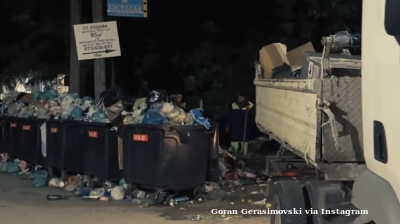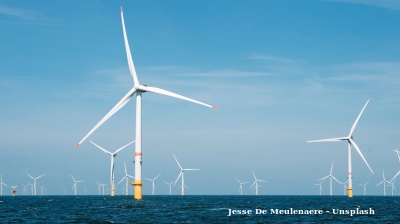Iraq is facing what officials are calling the "worst drought in its history," as water resources continue to dwindle and agricultural land deteriorates across the country, threatening both human security and economic stability, Al-Mada reported on April 23.
Member of Parliament Mustafa Sanad has warned that the country's water reserves have dropped dramatically to just 10bn cubic metres despite the arrival of spring. "The water reserve in Iraq has decreased to only 10bn cubic metres despite entering the spring season," Sanad told Al-Mada, attributing this to "lack of rainfall in the northern regions and the absence of snowfall, not only in Iraq but also in neighbouring countries Iran, Turkey and Syria."
Sanad revealed that "the amount of water consumption allocated for drinking in Iraq amounts to 6 bcm," noting that "the Ministry of Water Resources was forced to vote on an austerity water plan limited to drinking water only, without any agricultural plan, with the aim of keeping 4 bcm for the next season."
The Green Iraq Observatory, specialised in environmental affairs, has also sounded the alarm about the upcoming summer season amid rising drought conditions, significant water shortages, and the shrinking green belt, Shafaq News reported on April 25.
"The summer season is devastating for Iraq due to what it causes in terms of rising drought cases, most severe in the southern and central governorates followed by the northern ones, at a time when Iraq is suffering from a significant shortage of water, and this is a big problem," Omar Abdul Latif, a member of the observatory, told the News.
Abdul Latif highlighted issues with tree-planting campaigns, explaining that "what is observed is that there are campaigns to plant trees, but they cannot be watered due to lack of water or the distance of water sources from them, so trees begin to perish months after the campaign as a result of declining attention to them."
The crisis has had a severe impact on Iraq's buffalo population, which has more than halved in a decade as the country's two main rivers, the Tigris and Euphrates, suffer from drought conditions that endanger the livelihood of many farmers and breeders.
"People have left... We are a small number of houses remaining," said farmer Sabah Ismail, 38, who rears buffalo in the southern province of Dhi Qar. "The situation is difficult... I had 120 to 130 buffalo; now I only have 50 to 60. Some died, and we sold some because of the drought," Ismail added.
According to Iraqi marshland expert Jassim al-Assadi, the number of buffalo in Iraq has fallen since 2015 from 150,000 to fewer than 65,000. This decline is "mostly due to natural reasons: the lack of needed green pastures, pollution, illness... and also farmers refraining from farming buffalos due to scarcity of income," al-Assadi explained.
Water specialist Adel Al-Mukhtar has issued an urgent message to the Iraqi government regarding the impending water crisis. "Iraq is facing a major and dangerous drought crisis during the summer, which requires the Iraqi government to take urgent action to find solutions quickly through internal measures for water rationalisation as well as regional and international movement to ensure Iraq's fair share of water," Al-Mukhtar warned.
He cautioned that failure to act quickly would lead to the worst drought crisis in Iraq's history, with serious humanitarian, environmental, agricultural and economic repercussions. "We are facing a dangerous drought crisis that will destroy what remains of agriculture, lead to environmental pollution and drive migration from villages and rural areas to cities by some farmers and others," he stressed.
Iraq's agricultural lands have significantly diminished over recent years, with green areas reducing from about 50% to just 17% due to climate change and failures by citizens and responsible authorities to maintain green spaces. According to official statements, Iraq loses 100,000 dunams of land annually (one dunam equals 1,000 square metres) due to desertification, while the water crisis has caused agricultural lands to decrease by 50%.
The Iraqi Ministry of Agriculture has stated that the country needs to plant more than 15bn trees to secure vegetation cover that would eliminate desertification. According to estimates by the United Nations Food and Agriculture Organization (FAO), forest areas in Iraq now constitute only 8,250 square kilometres, representing just 2% of the country's total area.
MP Sanad also criticised the current government's policy, which he described as "giving priority to quick concrete electoral projects," warning that "Iraq is approaching lean financial and water years." He accused the prime minister of "preventing the minister and ministry from media appearances and making any statements."
According to experts, Iraq's drought crisis requires a comprehensive response including regional cooperation to improve water resource management, infrastructure modernisation, adoption of sustainable environmental policies, and support for affected communities to adapt to climate change.
bneGREEN

The Arctic and Antarctica record "off the charts" heat as polar warming accelerates
Parts of both the Arctic and Antarctic have experienced historically high temperatures in recent weeks, with weather stations in East Antarctica recording record-breaking warmth for the month of October, alarming climate scientists.

Giant glacier chunk breaks away in Tajikistan, mountain villages put on alert
Situation serves as reminder that climate crisis threatens to wreak havoc in Central Asian country.

Singapore’s green pivot – headline grabbing but still limited
Forays into offshore wind via regional cooperation with neighbours, and forward-looking bets on hydrogen and low-carbon fuels are making headlines, but the scale required to wean a heavily gas-dependent system off fossil fuels is still daunting.

North Macedonia's Skopje tackles mounting waste and rodent crisis
Locals say the problems in Skopje's Centar municipality worsened during the local election period when political campaigning took precedence over maintenance.




